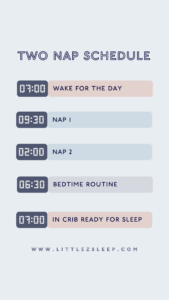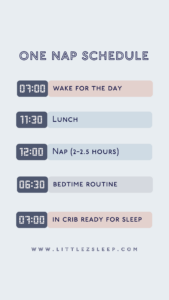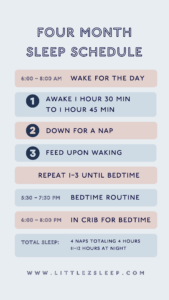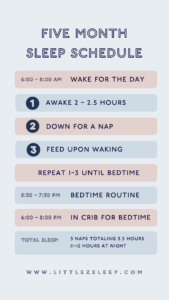Daylight Saving Time is coming! It’s time to get ready for a few days of adjusted naps + bedtimes, but don’t stress out!! This isn’t going to totally rock their sleep. And for some, it could be a way to shift bedtimes + solve early morning wakes!!
In this post we’re going to get into the Daylight Saving Time change coming up in just a few nights (or should I say mornings!) where I’ll share my strategy for how you can get through Daylight Savings… or even adjust your child’s schedule when the clocks spring forward. Let’s jump in!
MAKE CHANGES SUNDAY MORNING
On Sunday morning at 2am, most of the United States will be springing forward! Unless you live in one of those really wonderful places where that doesn’t happen, we’re going to be losing an hour of sleep.
You’re going to start making a change when you wake up.
There are some strategies out there where you can phase in a few days before the time change and make a few subtle changes in your child’s sleep.
I’m not really about that because for one thing, I don’t have time for that. I’d rather just focus on it when it happens. That’s just my personality! Our Little Z’s families have had success this way, too.
It is okay to wait until Sunday morning to start making your change. Don’t put pressure on yourself to do anything beforehand.
Sunday morning, when you wake up, it’ll be an hour later. This feels pretty good! It definitely feels better than the fall when you were starting the day at like 5am.
Now, the clock says 8am and you’re going to think it’s amazing that your baby slept til 8. No, it’s really 7, but let’s just celebrate that.
So get up, then change your clocks, get your coffee and get started for the day. This is when we are going to slightly adjust your child’s schedule.
HOW TO ADJUST YOUR CHILD’S SCHEDULE
Springing forward is basically the direct opposite from the fall. For the spring, we are actually going to adjust your baby’s nap and bedtime schedule to where they will feel like they’re going to bed 30 minutes sooner. Then about 3 to 4 days later, depending on the kid, we’re gonna go back to our normal time.
It takes about a week total to really adjust to this. You’ll only need to adjust their schedule for about 3 to 4 days before they get in line with this.
FOR A 2-NAP SCHEDULE
The 2-nap schedule is for babies who are 6-12 months.
With all of these numbers, you’re going to want to save this somewhere! So go ahead and download this graphic so that you can keep your schedule easily accessible while we adjust to the time change.

As you can see, we’re looking at a 7-7 schedule with a 9:30am and 2pm nap. On the adjusted day, your baby is waking up and it’s 8am. We’re going to then get your child down for their first nap at the new 10am.
This is going to feel 30 minutes earlier than what they have normally felt like, but remember – your baby is the most tired in the morning. So it really isn’t going to be that big of a deal to get them down 30 minutes sooner for this first nap simply because they’re ready.
I’m sure some of you are noticing your baby is yawning even an hour after they wake up. Get them down for that first nap at 10am, when they’ve been awake for 2 hours.
The second nap of the day is going to happen at 2:30pm, which is going to feel 30 minutes sooner. This will feel 30 minutes sooner, so get some activity in here – whether they’re practicing crawling, standing, sitting, walking, jumping, running, whatever they’re working on, get them outside (or stay inside!) and practice!
For bedtime, you’re going to get them down at 7:30pm, which will feel like 6:30pm. After a couple of days, you’ll be able to get back into your normal 9:30am and 2pm nap schedule, and they’ll fall back in line with the 7-7 night time rhythm.
WHAT TO DO IF YOUR CHILD WAKES UP EARLIER THAN NORMAL
Let’s say on that Sunday, your child happens to wake up at the new 7am. Well then, you might as well just go ahead and get them up and just keep them on the new schedule. They woke themselves up at 7am, which is the old 6am, and you can just jump straight into it.
That might be a great plan for you, but day of, if they happen to wake up early, make the call and just jump into the new time!
FOR A 1-NAP SCHEDULE
Next, let’s break down my traditional 1-nap schedule for children around 12-14 months up to age 3. Here’s the download for you to save to your phone!

Again, let’s look at a 7-7 schedule with one midday nap at 12pm.
So, on Sunday, they wake up and it’s the new 8am, which to their body feels like 7. You’re going to get them down for the midday nap at the new 12:30pm which feels like 11:30am – again, it only feels 30 minutes sooner!
This 30 minutes really shouldn’t be a huge deal. This is because I want you to get your child outside, wear them out, practice their skills, whatever it is, and avoid the car because they may fall asleep! If they fall asleep in the morning, you’ll have trouble getting them down.
So, put them down for a nap at the new 12:30pm and they can get their normal nap, anywhere from 1.5-2.5 hours, depending on your child’s age! For bedtime, we’re looking to get them down at 7:30, which is the old 6:30 and feels 30 minutes sooner.
In a few days, you’ll adjust them to their normal schedule by moving things up by 30 minutes again. It’ll only take about 4 days until they really feel like they’re adjusting to the change!
HOW TO USE THIS TIME CHANGE TO ADJUST YOUR CHILD’S SCHEDULE
If you’re wondering if you can use this time change to adjust your child’s schedule completely, I say go for it, you might as well just give it a shot!
Here’s why. Sometimes our Little Z’s families like to change their schedules for the seasons. Maybe when it’s warmer and lighter out, you want to be able to enjoy being outside together longer. You could change your child’s original 7-7 schedule to an 8-8 schedule to take advantage of that.
I cannot guarantee you that we can just get your child into this new time. They may not latch on to it very quickly because body clocks are very sensitive. Even though your child cannot read numbers, their body is very in tune to things!
So to help with some of this, here’s my number one tip. Get outside!!
It’s the same thing I would do if you are maybe dealing with jetlag, or you’re moving to a new time zone… things like that. Get outside and allow your child to soak up the evening sun. This is a huge way for your body to trigger time to produce melatonin.
Melatonin is a naturally occurring hormone in our bodies that helps us fall asleep and stay asleep all night long.
Hint, hint, wink wink, you don’t need melatonin supplements!! It is absolutely not necessary. We make enough, okay? Unless medically directed, there are very, very few cases where someone is not producing melatonin, but for a majority, everybody’s fine.
So let’s just look at making sure we get outside, run around, play, play, play, then go inside to get ready for bed, close the blinds and the curtains to make the house a little bit darker. With the natural sunlight beginning to be blocked out, your body is cued to produce the melatonin and help adjust your child to the new schedule.
If you’re looking to realign and get a bit of a later start in the morning, go for it and use this time change as an opportunity to do so! I just can’t guarantee it’ll stick because every baby is different. Their body may just prefer one or the other.
FOR BABIES 0-6 MONTHS OLD
Now, I’ve talked about if you want to readjust your schedule if your child has a 2-nap or 1-nap schedule. But what about those littles who are under 6 months old and there is no nap schedule?
Here’s what I want you to know. It really doesn’t matter about adjusting the times because we are simply watching the clock.
We want to make sure that your child’s awake times are being honored, which is a huge deal!
If your child is a newborn, they’re going down every 45-60 minutes for a nap and this time change isn’t really going to affect them.
For 4-5 month olds, your child is going down for a nap about every 1.5-2.5 hours. They will have a range of time where they’re going to bed at night and starting their day (I recommend between 6:30 and 8) and then you want to honor their awake windows.
We still are looking for 11 to 12 hours in their crib at night with one possible night feeding.
There’s not a lot of adjusting here – it’ll happen mostly after 6 months old – but here is a free download you can save to your phone for your 4 or 5 month old.


IF YOUR CHILD DOES NOT NAP WELL
The last thing I want to talk about is if your child doesn’t nap at all on Sunday, you can do one of two things.
- You could readjust your child’s schedule! If you want to get them down to bed at 8 now instead of 7, go for it.
- Because your child isn’t napping, have the most fun day ever on Sunday and wear them out! Get them to bed at the new time. For example, if you’re aiming for bed at 7pm, which the day before was 6pm, plan a super fun exhausting day where your child is just wiped and ready for bed.
That will really just depend on your kiddo. And remember, if you want to realign their schedule, you could just jump straight in and just have a great fun, wonderful, exhausting day.
CONCLUSION
Daylight Saving Time is coming but you don’t have to stress out! You can expect a few days of adjusted naps + bedtimes, but this isn’t going to totally rock their sleep.
Here’s what you can expect:
- Spring forward the morning that Daylight Savings happens! You don’t have to do anything in advance.
- For 3-4 days, adjust their schedule by about 30 minutes so it feels like they’re only going to bed 30 minutes earlier than normal.
- Or, keep Sunday extra fun and busy and jump into the new time so they’re worn out by bedtime (which will feel an hour earlier than normal!)
And for some, it could be a way to shift bedtimes + solve early morning wakes!!
LOVE THIS? PIN FOR LATER!

FLASH SALE
ONE WEEK ONLY
Keep sleep a thing on vacation with the Little Z's Travel Guide!